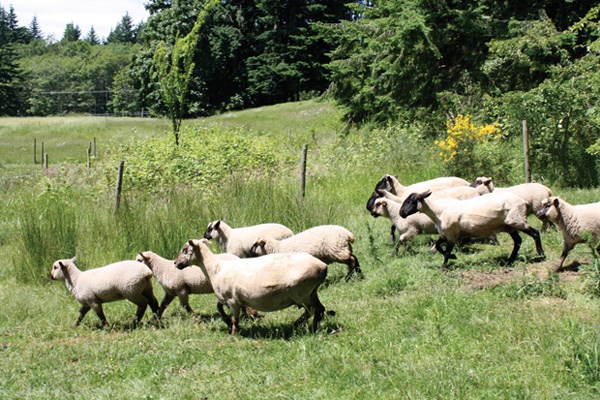John and Lorraine Buchanan may haul their own sheep to a new pasture, but can’t pick up a neighbour’s animals en route.
The Metchosin couple are allowed to drive their unprocessed lamb to a farmer’s market and sell it directly to consumers, but can’t sell to another market vendor.
They have also been told they may not use their farm van to bring the Parry Bay Sheep Farm’s frozen lamb to restaurants in Victoria.
Or maybe they can. It depends on whom you ask, on which insurance rep is interpreting the rules for vehicles licensed for agricultural use, including the clause that says trucks with farm plates are limited to “the delivery of unprocessed products owned by the farmer.”
It seems the word “unprocessed” is subjective.
“Is a carcass of meat unprocessed?” asks John. “Is cut up and frozen unprocessed?”
Good luck getting a consistent answer. One agent even told the Buchanans the clause meant they couldn’t deliver a load of bucked-up firewood.
Of course, they could avoid the confusing farm-plate restrictions by getting commercial insurance for their vehicles, but that would cost at least another $1,500 a year — too much for farming’s razor-thin profit margins.
Those aren’t the Buchanans’ only insurance woes. They usually throw open the doors of their Metchosin barn to local children during lambing season — a free peek at the miracle of birth — but stopped after their insurer said hosting visitors would cost them $43 per field trip.
“You shouldn’t have to pay for 4-H kids to come take a look at your farm,” John says.
Then, after the farm agreed to take over the local meat packer this July 1, their insurance company dropped Parry Bay altogether. Too much risk for an insurer that was already nervous about covering a farm that raises chickens. Now the Buchanans are scrambling to find coverage.
It’s just another example of how, for all our chatter about supporting local agriculture, the reality for farmers is one stumbling block after another, people in gumboots tripping over decisions made by guys in shiny shoes.
The Parry Bay Sheep Farm should be a roaring success — and by many standards it is.
The Buchanans are well established, have been running the Island’s biggest sheep farm for more than 30 years.
They keep 300 ewes, which give birth to 700 lambs, pastured in 30 sites rented around Metchosin, the Highlands, the Saanich Peninsula. If you see lambs gamboling in a Metchosin field, odds are they’re theirs.
The farm enjoys a solid customer base, restaurants from Café Brio to the Pink Bicycle, butchers from Glenwood Meats to the Red Barn Markets. Wool goes to a co-op in Vancouver. The Buchanans combine with other farmers to grow wheat for the Portofino and Wildfire bakeries.
Right now, John and Lorraine are in the hay fields — 130 acres of feed for the Island’s livestock — until 9 every night.
Except their fertilizer arrived late this year, lowering the hay fields’ yield, costing them $15,000. And the price of wool barely covers the cost of shipping. And they took over the Metchosin meat packer mostly because its operator wanted out, and if that plant closes their only alternative would be to ship their lambs off-Island or up-Island for slaughter.
Railway supply issues have made it hard to get grain, crucial to Island farms in winter. Predation by cougars forced the Buchanans to abandon three pastures. Other pastures have become hard to find, landowners discovering they can earn enough money to qualify for farm status — and a tax break — by growing hay alone; keeping livestock means spending money on fencing.
As the number of farms has dwindled, so has the supporting infrastructure — castrators, large-animal veterinarians, neighbours to split the cost of equipment — which in turn puts pressure on the surviving farms.
In a typical year, all this hard work, investment and uncertainty results in the farm clearing maybe $20,000.
The Buchanans would be better off to cash out.
“Unfortunately,” Lorraine says, “we still like farming.”
That’s good for those of us who like local food. Too bad we make it so hard for the farmers to grow it.



